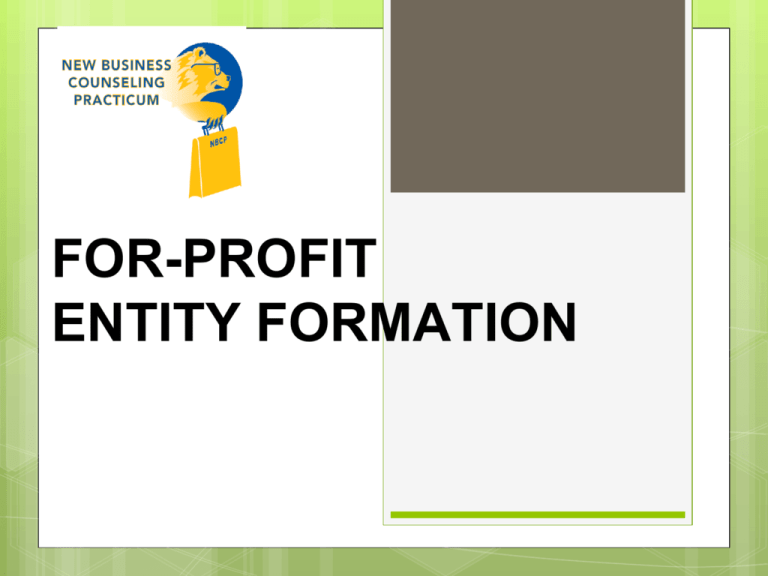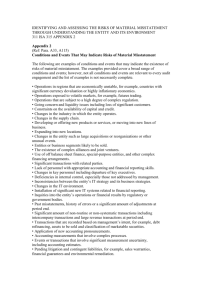for-profit entity formation
advertisement

FOR-PROFIT ENTITY FORMATION THIS DOES NOT SUBSTITUTE FOR LEGAL ADVICE Just as a reminder: ● This is an Introduction to Legal Issues that commonly affect our clients ● This is not a substitute for working with a Lawyer or coming directly to us with your issues, which is always recommended UCB New Business Practicum © 2014 Why Form a Legal Entity for your Business? ○ Create Separation Between You and the Business - Liability - Tax - Perpetual Existence ○ Create a Vehicle for Raising Capital ○ Increase Credibility The Entity Options ○ Sole Proprietorship ○ Partnership (several kinds) ○ Corporation (several kinds) ○ Limited Liability Company (several kinds) CAREFUL! Presumptions if NO CHOICE is made: ○ If Single/Married Couple: Sole Proprietorship ○ If 2+ People: Partnership How to Choose an Entity ○ LEAST Important Question--What’s Easiest? ○ Lowest Cost Filing Fees ○ Lowest Cost Legal Fees ○ Least Amount of Paperwork Most Important Questions: GOVERNANCE TAX LIABILITY CAPITAL GOVERNANCE Several Entrepreneurs Board of Directors TAXATION ENTITY LEVEL Income Entity • Entity reports and pays taxes on net profits through its tax return Owners • Owners report and pay taxes through their tax returns on any profit sharing they receive (at lower “dividend” tax rate) TAXATION PASS THROUGH Income Entity • Entity is not treated as a taxpayer: only reports net profits on its tax return Owners • All net profits “pass through” to the owners as income, who report and pay tax through their individual tax returns. LIABILITY ➢ PERSONAL LIABILITY: if company doesn’t have enough money to pay damages in lawsuit, plaintiff can collect remaining damage award from your PERSONAL ASSETS! ○ SOLE ○ SHARED ➢ LIMITED LIABILITY: only liable up to level of what you invest/contribute to the business; personal assets are safe. → Exceptions: Personal negligence, Personal guarantees, Intentional harm, Insufficient entity formalities, Undercapitalization, Leadership violation of fiduciary duties, Law violations = you can still be sued and found personally liable. CAPITALIZATION How to Capitalize Your Business ➢ Personal Funds from entrepreneurs, friends, family ➢ Debt ○ Could be from a bank or private creditor ○ Convertible debt (= if you are doing well, convert debt → stock) ○ Can be secured with collateral (e.g. House/Car) ➢ Equity ○ Arranged in the entity’s formative documents ○ Can include a variety of rights: profit-sharing, managing, liquidation preferences, other perks Specials - S Corps Special Requirements for S-Corporations ❏ ❏ ❏ ❏ Limit on # of Shareholders (limited to 100) Shareholders generally must be HUMAN (certain Trusts OK) Shareholders must be U.S. Citizens or have Legal Residency Have to follow board formalities ❏ 3+ Directors, Meetings, Minutes ❏ Only one class of stock (equal economic rights) ❏ NO preferred stock ❏ Proportional sharing of profits/losses ❏ E.g., 60% stock = 60% profits What if you break the rules? AUTO conversion to C-Corp Specials - Flex/B Corp Two NEW types of FOR-PROFIT Corporations Flexible Purpose Corp Benefit Corp ● Must Produce a Public Benefit ● Must Produce a Public Benefit ● Director Protections for Actions taken to Further the Public Benefit ● Director Protections for Actions taken to Further the Public Benefit ● Shareholder Protections ● Shareholder Protections ● Transparency Required ● Transparency Required ● 3rd Party Assessment ● Enforcement by Shareholders or Named individuals QUICK REVIEW IF YOU: CONSIDER: Want total control Sole P, LP, Manager- Managed LLC Are doing something risky Need to apply for grants or give tax breaks to donors Want to keep equity within “the family” Want to attract venture capital LLC, Corporation Non-Profit Corporation Partnership, LLC, For Profit Corporation C Corporation For a more detailed overview, Check out the handout/chart: Characteristics of Different Business Entities Where to Incorporate-CA v. DE GENERAL RULE - where to form Form your Entity in the State Where your Operations and “Brain” will Be. Result: - Simplifies Government Requirements: - Each State has own system of Taxation - Each State has own system of Regulation - Forming in One State, while operating in another, can make you subject to BOTH - Can always change later if needed However, if you plan to get big, or plan to raise Venture Capital, you should consider Incorporating In Delaware. Why? ● DE corporate law has been the most pro-management a. DE Law is more forgiving of corporate leadership mistakes b. Greater protection for board members against shareholder lawsuits c. Minority shareholders have fewer rights ● DE corporate law is more developed a. DE Law allows management and investors to predict outcomes better if lawsuits arise b. DE is home to most of the largest U.S. corps, so the documents for corporate transactions are more familiar to major investors. Costs of Incorporating and Earning Income in Delaware ● Franchise Taxes in Delaware are calculated according to two different methods: see http://corp.delaware.gov/frtaxcalc.shtml ○ The minimum tax is $175.00, for corporations using the Authorized Shares method, and $350.00 for corporations using the Assumed Par Value Capital Method. ○ All corporations using either method will have a maximum tax of $180,000.00. ● Delaware Corporate Income Tax is 8.7% ● A Delaware corporation must also maintain a registered agent for service of process in Delaware, which usually costs around $90 a year. Problem: Forming in DE, but Operating/Having Corporate Brain in CA =Subject to BOTH Laws ● Delaware corporations conducting business in California must file a statement of qualification in California and pay the CA minimum franchise tax of $800. This is in addition to paying DE franchise tax. ● The Delaware corporation must pay to file in Delaware and must pay to run the corporation in California, which amounts to extra money in filing fees and legal costs to stay on top of two state’s legal requirements. ● The Delaware corporation must also maintain a registered agent for service of process in Delaware, which usually costs around $90 a year. Forming in DE ➢ Advantages ○ More attractive to VC investors ➢ Disadvantages ○ If operating/have corporate brain elsewhere, have to pay double franchise tax Forming only in CA ➢ Advantages ○ No double franchise tax ○ Easy to operate (only one state law to worry about) ➢ Disadvantages ○ Potentially less attractive to VC investors ○ Potential hassle if you choose to reincorporate in DE How to Reincorporate in a Different State ● Form an entity in state B, use assets from entity in state A to buy shares in new entity. ● If assets in first entity are appreciable, then there might be taxes due on gain from sale of state A entity assets to state B entity. ● Bottom line: Not difficult to do, some extra filing expenses, but be sure to discuss with a tax accountant. CAPITALIZATION Raising Capital Where to get it? Balance Needed: ○ ○ ○ ○ ○ ○ Founders Family and Friends Banks/Private Creditors Equity Investors Grant agencies ○ Government Funds From You + No need to pay back if fail - Can’t bankrupt self/family ○ Debt + No need to give up control - Have to pay back Why do you need it? ○ ○ ○ Startup costs Ongoing expenses Capital improvements ○ Equity + No need to pay back if fail - Need to give up some control A Typical Capitalization “Paid in capital” Founders put in some of their own money Long term Debt Bank Loan for equipm ent Sole P., S-Corp., LLC, Partnership, or C-Corp. Equity Venture Capital Venture Capital (Second round) Private corporation Common Stock IPO Public corporation Time Overview – 3 (Legal) Ways to Raise Capital ○ ○ ○ 1) “Traditional” sales of Securities/Equity 2) “Kickstarter” model – pre-sales of goods 3) New Option – Crowdfunding > Each option will have its pros and cons – it will really depend on your specific needs to determine which path is correct, and at what time. There is no reason you couldn’t do all of these as your business grows and changes... “Traditional” Sales of Securities ○ What is a “security?” ○ Any note, stock, bond, investment contracts, etc. ○ Law also has a catch-all, so if it seems like it could be a security the law will probably treat it like one ○ Selling securities can require a significant amount of effort to comply with Securities and Exchange Commission (SEC) regulations (1933 Act, JOBS Act, etc.)...form 25102 filing ○ However, there are several exemptions available. ○ Please note, when filing for an exemption, it is the state in which the shares will be issued that you file for the exemption. Selling Securities (Cont’d) ○ Selling = exchanging shares for something of value (not necessarily cash...i.e. reduced lease payments) You can avoid many of the SEC regulations by conforming with REGULATION D, which requires: ○Selling to friends, family, and those with prior relationships to the Company or its founders (e.g., your website designer). ○Selling to Accredited Investors. In fact it is generally best to avoid unaccredited investors except where absolutely necessary An “Accredited” Investor is someone with a net worth (excluding their primary residence) in excess of $1M or someone whose income for the previous two years exceeds $200k (or $300k for the investor and his/her spouse) Regulation D Safe Harbor Most Common Exemption - Rule 504 ○ ○ ○ ○ ○ ○ Limited to $1M in any 12 mo. period Must be a private offering (i.e., no advertising) Can sell to Unaccredited Investors (friends/family) and Accredited Investors No disclosures necessary Can only sell “restricted stock” – stock which cannot be resold without incurring SEC disclosure and registration. Within 15 days of issuance, have to file: • • With the SEC: Form D http://www.sec.gov/about/forms/formd.pdf With the State of California: Form 25102 http://www.corp.ca.gov/LOEN/pdf/25102f.pdf Founders’ Stock ○ Generally, founders take equity distributions in the form of stock when the entity is formed. ○Usually subject to a vesting schedule to ensure each recipient contributes for a period of time ○ Based on the “Fair Market Value” of the stock, the founder may have income for tax purposes when they receive the stock ○ Caution: issuing shares for past labor may trigger tax liability Pre-sales of Goods The Kickstarter” Model ○ ○ ○ ○ Unlike selling a security, or a direct investment in your company, you can sell a product before it is made. So if you are making a watch you can solicit payments for your watch before you make it so you have enough capital to begin manufacture You aren’t selling a security or future investment, you are selling a tangible product Provided you get enough “pre-sales,” this can generate enough cash on hand to pay for initial manufacturing that can be difficult to finance. Coming Soon: Crowdfunding ○ What is crowdfunding? ○Using the internet to raise capital through small contributions from a large number of participants, typically in exchange for a small equity stake ○ Sites like AngelList (angel.co) have helped many projects and small businesses raise money through small investments ○ In April 2012, the Jumpstart Our Business Startups (JOBS) Act mandated that the SEC propose rules for equity crowdfunding, i.e., selling securities through the internet SEC Proposed Rules: Overview 1. ○ ○ ○ ○ Companies can only raise up to $1 million TOTAL in 12mo period $1M limit includes not only crowdfunding, but ALL forms of investment If raising less than $100k only need to provide income tax returns for last year and unaudited financials If raising $100-500k must provide tax returns and financials that have been reviewed by a CPA If raising more than $500k must provide audited financials ○ This can be very expensive... SEC Proposed Rules: (Cont’d) 1. Companies must disclose additional information ○ Complete Business Plan required ○ Must describe how proceeds will be used ○ Must describe the ownership structure of the company 2. Investors can only invest a certain percentage of their income ○ Income/ net worth < $100,000: can invest greater of $2k or 5% of income ○ Income/ net worth > $100,000: can invest 10% of annual income or net worth ○ Capped at $100,000 per year regardless of income 3. Companies are not required to verify investor income levels Crowdfunding: Pros and Cons Pros ○ ○ Increased access to capital ✓ Especially beneficial for companies that wouldn’t attract venture capital Better exposure for companies Cons ○ ○ ○ Amount of capital is limited; might be better off with “traditional” funding methods People won’t want to put a lot of money into a company they aren’t familiar with Lots of additional disclosure/information required to qualify Final Thoughts ○ There is no “perfect” entity ○ You will have to balance the plusses and minuses of taxation, capitalization, governance and, to a lesser extent, liability ○ Don’t worry about the filing process/fees...in the long run they are a non-factor ○ Franchise Fees ○ $800/yr in CA and NOT pro-rated so wait until Jan 1. to file unless you must engage in a higher risk activity before then ○ AND first year franchise tax is waived in CA for Corporations (not LLCs) so if you incorporate Jan 1, 2015 you won’t have to pay 2015 corporate franchise tax. Additional Good Resources: - Nolo Press Books - For Questions/More Info: UCB New Business Practicum wkell@law.berkeley.edu






